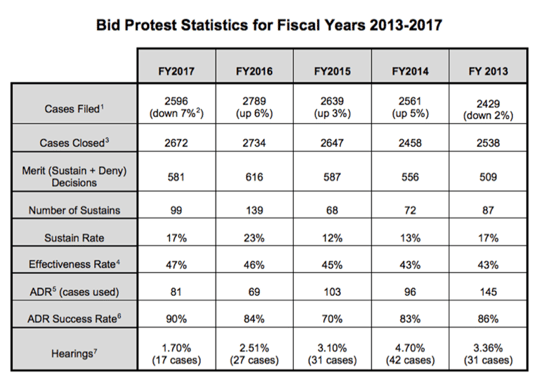 In Part I of the GAO Protest blog, we discussed the frustration of having your contract award protested. It’s equally vexing when the contract your team worked hard to capture was, or is about to be, awarded improperly or illegally. Even worse, if your company is unfairly denied the opportunity to even compete. When this occurs, you may want to consider the benefits of filing a protest.
In Part I of the GAO Protest blog, we discussed the frustration of having your contract award protested. It’s equally vexing when the contract your team worked hard to capture was, or is about to be, awarded improperly or illegally. Even worse, if your company is unfairly denied the opportunity to even compete. When this occurs, you may want to consider the benefits of filing a protest.
Who May File a Protest with the GAO
Any contractor that could have made money from a procurement but was prevented from doing so based on either how the agency evaluated the proposals, can protest (4 C.F.R. § 21.0(a)(1).) The GAO calls this an “interested party.” If that’s you, you can protest. Whether the solicitation was a single award, an indefinite-delivery/indefinite-quantity contract (IDIQ or MAC) or even a task order (TO) on a MAC IDIQ, you can file a protest with the GAO.
Many companies don’t file because they’re fearful of upsetting their customer. The truth of the matter is, the government customer will do whatever it takes to avoid a protest. They are going to pay attention to the “dog that bites, not the one that lays quietly in the corner.” In other words, if your company never protests, the government might, especially on a tight bid in a best value scenario, give the award to the company most likely to protest.
Why File Protests with the GAO
If you decide to protest, you have three forums: 1. The contracting agency, usually not considered very effective; 2. The Court of Federal Claims (COFC), where it will likely take a while and you’ll need deep pockets for an attorney (but decisions are binding); and 3. The General Accounting Office (GAO).
GAO has earned its reputation of being an impartial and fair decision maker on the merits of the protests filed with the agency. Though their findings are not binding, very rarely are they ignored by the contracting office responsible for the solicitation or award that is being protested. It’s less expensive, only requiring a filing fee collected to support the new GAO Electronic Protest Docketing System (EPDS). It’s not necessary to hire a lawyer to file a protest with the GAO but having an attorney who understands the process can be beneficial.
The GAO releases yearly statistics on the number and outcome of protests filed by contractors. The data for 2017 shows that protestors are more often receiving some sort of compensation from the awarding agency. (see Effectiveness Rate on table below as compared to the Number of Sustains, year-over-year.) Even though less people are protesting with the GAO, the results of the protests have become more effective.

What You Can and Can’t Protest with the GAO
Here are the most common grounds for protest:
- The contracting agency unfairly rejected your bid;
- The agency awarded or is going to award someone else the contract out of bias;
- Something was wrong, impossible or unclear about the agency’s solicitation;
- The agency cancelled the solicitation, leaving you empty-handed.
Common reasons you can’t protest (4 CFR 21.5):
- Any issue you have with your government customer about a contract you already have in place with them.
- Your small business doesn’t qualify as a small business. (That goes through the Small Business Administration.)
- If the KO decides you can’t handle the work (with exceptions).
- If you’re a subcontractor (some exceptions to that, too).
- If your proposal wasn’t in the competitive price range.
When You Can Protest
You can protest either pre-award or post award. In a pre-award protest, a company protests the terms, conditions or some other aspect of the solicitation before the proposal submission deadline. If you see a flaw in the solicitation while your preparing your proposal, the first step is to submit a question to the KO or specified point of contact in the solicitation by the required date for questions. If the government is not responsive to your question or comment, you must file your protest prior to due date for initial proposals. If the issue was not apparent until after the closing date, you have ten days to file from the time the flaw was discovered.
Post award protests are all about timing. To protest post-award, you must have requested a debriefing in writing within a three-day period after you received notice of the awardee or awardees (48 CFR 15.506(a)). You have ten days from the formal debriefing to file a protest (4 C.F.R. § 21.2(a)(2).)
Summary
We hoped this helped simplify the GAO protest for you and gave you some information to help you make your decision. GAO protests are common, quick, inexpensive and simple and have a climbing success rate. As long as you follow the protocol with a valid and reasonable protest, this sends the message that you’re a serious contractor to not only your competition, but your government customer.
Capture2Proposal monitors protests filed with the GAO and updates affected opportunities to notify our customers when protests are filed and when they are resolved.
For all the details about GAO protests, download the GAO Protest Guide through the GAO website.

